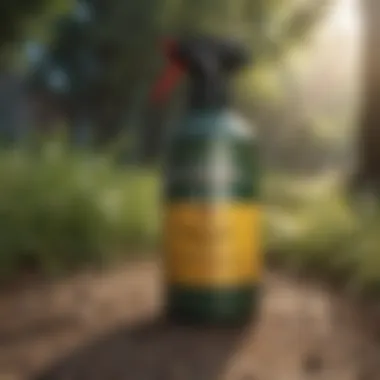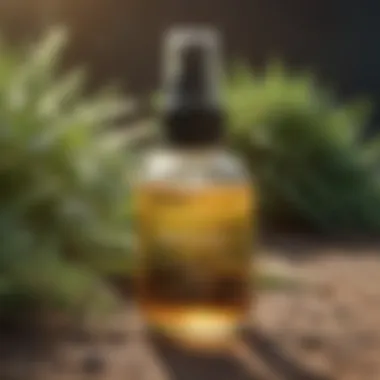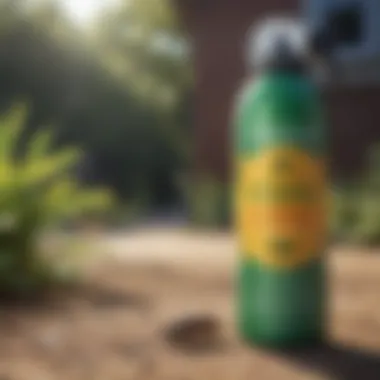Unveiling the Ultimate Outdoor Yard Bug Sprays: A Comprehensive Guide


Preventive Pest Control Strategies
Constructing a shield against unwanted invaders begins with implementing preventive pest control strategies. Securing your house exterior calls for sealing cracks to eliminate potential entry points for pests. Maintaining a clutter-free outdoor space by clearing debris not only enhances aesthetics but also deters pests from nesting. Proactively discouraging pests from infiltrating your home involves employing tactics such as installing door sweeps, repairing damaged screens, and sealing gaps around windows. Moving on to yard maintenance, adhering to essential routines like mowing the lawn regularly, trimming overgrown vegetation, and removing standing water helps in keeping your yard uninhabitable for pests. Emphasizing indoor cleanliness is crucial to pest prevention; expert cleaning practices and techniques like vacuuming regularly, storing food appropriately, and fixing leaky faucets contribute to creating an environment that repels pests. Effective garbage disposal methods such as utilizing tightly sealed bins, disposing of food waste promptly, and separating recyclables help in reducing attractions for pests. Additionally, embracing innovative pest prevention strategies like installing ultrasonic pest repellents can add another layer of protection to your abode.
Identifying Pest Risk Areas
Spotting potential pest havens begins with inspecting moisture-prone areas in and around your home. Identifying damp conditions and taking preventive measures like fixing leaks and improving ventilation are imperative steps towards thwarting infestations. Conducting thorough examinations of cracks and crevices aids in determining possible entry points for pests; sealing these openings with caulk or weather stripping acts as a barrier against unwanted intruders. Assessing greenery for pest risks involves understanding how plants can attract pests and adopting landscaping practices that discourage infestations. Furthermore, identifying and addressing other miscellaneous pest risk areas like attics, basements, and crawl spaces ensures comprehensive protection against invaders.
Effective Pest Control Methods
Harnessing diverse pest control techniques empowers homeowners to combat infestations effectively. Embracing natural repellents made from essential oils, herbs, and plants provides a safe and environmentally friendly approach to ward off pests. Chemical sprays formulated for specific pests offer targeted solutions for eradicating infestations; ensuring proper application and adhering to safety precautions are paramount when using these products. Deploying pest traps strategically aids in capturing and removing pests humanely, thereby preventing future intrusions. Incorporating biological control methods like introducing natural predators or using beneficial nematodes presents a sustainable approach to pest management. Exploring unconventional pest control methods beyond mainstream options enables homeowners to tailor their strategies to suit their unique pest problems.
Pest Species Identification
A key part of effective pest control involves accurately identifying common nuisances that may infiltrate your home. Understanding the behaviors and habits of prevalent insects such as ants, cockro[truncated for brevity]
Understanding Outdoor Yard Bug Sprays
When it comes to enjoying the great outdoors, dealing with pesky bugs is an inevitable challenge that many homeowners face. Understanding Outdoor Yard Bug Sprays is crucial in combatting these nuisances effectively. This section of the article aims to delve into the various types of bug sprays available, ranging from chemical solutions to natural remedies and organic insecticides, to help you make an informed choice tailored to your needs.
Types of Outdoor Yard Bug Sprays
Chemical Bug Sprays
Chemical Bug Sprays play a significant role in eradicating stubborn outdoor pests swiftly. Their potent formulas are designed to target and eliminate insects effectively, making them a popular choice for homeowners seeking immediate results. The key characteristic of Chemical Bug Sprays lies in their fast-acting nature, providing a quick solution to bug infestations. However, it is essential to note that these sprays contain chemical compounds that may pose risks to human and environmental health. While their efficiency is undeniable, users must exercise caution and follow safety guidelines during application.
Natural Bug Repellents
Natural Bug Repellents offer a safer alternative to chemical sprays, utilizing plant-based ingredients to deter insects naturally. These repellents are gentle on the environment and human health, making them an attractive option for eco-conscious individuals. The key characteristic of Natural Bug Repellents is their non-toxic composition, ensuring a gentle approach to insect control. Despite their eco-friendly nature, natural repellents may require more frequent application compared to chemical sprays due to their milder formulas.
Organic Insecticides
Organic Insecticides are derived from natural sources and are formulated to target pests without harming beneficial organisms in the ecosystem. The key characteristic of Organic Insecticides lies in their minimal impact on the environment, making them a sustainable choice for bug control. While they may be less potent than chemical sprays, organic insecticides offer a greener solution for homeowners looking to maintain a balance between pest control and environmental preservation.
Factors to Consider When Choosing a Bug Spray
Effectiveness


Effectiveness is a crucial factor to consider when selecting a bug spray for your outdoor space. The primary goal of any bug spray is to eliminate pests efficiently, ensuring lasting protection against infestations. The key characteristic of an effective bug spray is its ability to target a wide range of insects and provide long-lasting results. While some sprays offer instant eradication, others work gradually but provide extended protection against bugs.
Safety
Safety is paramount when using bug sprays, especially in outdoor settings where exposure to chemicals can be higher. Choosing a bug spray that prioritizes safety minimizes health risks for you, your family, and pets. The key characteristic of a safe bug spray is its low toxicity and user-friendly application, ensuring peace of mind while tackling insect problems. By following safety instructions and using protective gear, you can mitigate any potential risks associated with bug spray usage.
Environmental Impact
Considering the environmental impact of bug sprays is essential for sustainable pest management. Opting for products that have minimal ecological consequences helps preserve biodiversity and natural ecosystems. The key characteristic of bug sprays with low environmental impact is their biodegradable and eco-friendly formulations, reducing chemical residues in the soil and water. By choosing environmentally conscious bug sprays, you contribute to environmental conservation and promote a healthier outdoor environment for all species.
Best Chemical Bug Sprays for Outdoor Use
Top Brands in Chemical Bug Sprays
Ortho Home Defense Insect Killer
Ortho Home Defense Insect Killer stands out for its remarkable effectiveness in eradicating a wide range of bugs prevalent in outdoor spaces. This bug spray's key characteristic lies in its long-lasting residual action, ensuring extended protection against insect infestations. Users appreciate its ability to create a protective barrier around the treated area, warding off bugs effectively. While Ortho Home Defense Insect Killer is a popular choice due to its efficacy, some may find its chemical composition a drawback in terms of environmental impact.
Spectracide Triazicide Insect Killer
Among the top brands, Spectracide Triazicide Insect Killer excels in its quick action against insects, delivering fast results for bug control. The key characteristic of this bug spray is its broad-spectrum coverage, targeting various insects like ants, mosquitoes, and ticks. Its unique feature lies in the ready-to-spray format, making application convenient for users. However, some users may find its potency a double-edged sword, necessitating careful handling during application.
Raid Yard Guard Mosquito Fogger
Raid Yard Guard Mosquito Fogger is a popular choice for combating mosquito infestations in outdoor areas due to its convenience and ease of use. The key characteristic of this bug spray is its ability to efficiently dispel mosquitoes through fogging, covering a wide area effectively. The unique feature of Raid Yard Guard Mosquito Fogger is its rapid action, providing quick relief from mosquito nuisances. While this bug spray offers immediate results, repeated usage may be required for continual mosquito control.
Natural Remedies for Outdoor Bug Control
In the realm of outdoor yard bug sprays, natural remedies play a vital role in providing effective bug control while minimizing environmental impact. Choosing natural bug repellents can be a wise decision for those looking to avoid harsh chemicals and prioritize eco-friendly solutions. Natural remedies offer a safer alternative that is still highly effective in combating bugs that can disrupt your outdoor activities.
Effective Natural Bug Repellents
Citronella Candles
Citronella candles are a popular choice for outdoor bug control due to their ability to repel mosquitoes and bugs effectively. The key characteristic of citronella candles lies in the scent they emit, which acts as a natural repellent against insects. This makes them a preferred choice for those looking for a chemical-free bug control option. However, the effectiveness of citronella candles may vary based on factors like wind conditions and the outdoor environment. Despite this, citronella candles remain a go-to natural bug repellent for many individuals seeking a non-toxic solution.
Lemon Eucalyptus Oil
Lemon eucalyptus oil is another effective natural bug repellent that offers a pleasant citrus scent while deterring insects. The key characteristic of this oil is its active ingredient, PMD (para-menthane-3,8-diol), which has been proven to repel mosquitoes effectively. Lemon eucalyptus oil is a popular choice due to its natural origins and efficacy in keeping bugs at bay. However, individuals with sensitive skin should perform a patch test before using it directly on the skin to avoid potential irritation.


Neem Oil
Neem oil, derived from the neem tree, is a powerful natural insect repellent known for its pesticidal properties. The key characteristic of neem oil is its compound called azadirachtin, which disrupts the feeding and reproduction of bugs, offering a sustainable pest control solution. Despite its effectiveness, neem oil may have a strong odor that some individuals may find unpleasant. Nevertheless, its natural composition and ability to target a wide range of pests make neem oil a valuable addition to natural bug control remedies.
DIY Bug Spray Recipes
Crafting DIY bug spray recipes can provide a cost-effective and customizable approach to outdoor bug control. By using simple household ingredients, individuals can create effective bug repellents tailored to their specific needs.
Vinegar and Essential Oils
Combining vinegar with essential oils like citronella, lavender, or peppermint can create a potent bug repellent spray. The key characteristic of this DIY recipe is the acetic acid in vinegar, which helps repel insects, coupled with the natural scents of essential oils that bugs find unpleasant. This combination offers a non-toxic alternative to commercial bug sprays, although reapplication may be necessary for long-lasting protection.
Citrus Peel Solution
A citrus peel solution involves soaking citrus peels in water to create a homemade bug repellent with a pleasant citrus fragrance. The key characteristic of this recipe is the natural oils present in citrus peels, which bugs tend to avoid. Citrus peel solutions are simple to make and can be an effective way to ward off insects while naturally freshening the air. However, the efficacy of this repellent may diminish over time, requiring occasional replenishment of the solution.
Garlic and Peppermint Infusion
An infusion of garlic and peppermint can create a powerful bug spray that deters a wide range of insects. The strong scent of garlic and peppermint is the key characteristic of this homemade repellent, acting as a natural barrier against bugs. This DIY recipe is favored for its simplicity and affordability, offering a natural alternative to chemical-laden sprays. However, individuals sensitive to strong scents may find this solution overpowering, requiring proper ventilation during application.
Organic Insecticides for Eco-Friendly Bug Control
In the quest for bug-free outdoor spaces, the significance of organic insecticides cannot be overstated. As a pivotal section of this article, exploring the realm of eco-friendly bug control through organic solutions unveils a holistic approach to pest management. Organic insecticides, derived from natural sources and free from synthetic chemicals, cater to individuals seeking a greener and safer alternative for bug control. By delving into the specific elements, benefits, and considerations surrounding organic insecticides, this section aims to equip readers with in-depth knowledge to make informed decisions regarding their pest management strategies.
Benefits of Organic Insecticides
Non-Toxic Formulations
One of the hallmark features of organic insecticides is their non-toxic nature. These formulations prioritize the use of natural ingredients, eliminating the risks associated with harmful chemicals. This aspect not only ensures the safety of household members, including children and pets but also contributes to a sustainable and environmentally conscious bug control approach. The non-toxic nature of organic insecticides resonates as a popular choice within this article as it aligns with the underlying theme of promoting health and eco-friendliness.
Safe for Beneficial Insects
Organic insecticides stand out for their compatibility with beneficial insects, distinguishing them from traditional chemical sprays that may pose harm to beneficial species. By selectively targeting pests while sparing beneficial insects like pollinators and predatory species, organic solutions facilitate a harmonious ecosystem within the yard, promoting biodiversity and natural pest control mechanisms. This unique feature not only underscores the ecological orientation of organic insecticides but also emphasizes their role in fostering a balanced yard ecosystem.
Minimal Residual Impact
The minimal residual impact of organic insecticides represents a key advantage in the realm of eco-friendly bug control. Unlike conventional insecticides that may leave long-lasting residues harmful to the environment, organic alternatives break down naturally, minimizing their footprint post-application. This characteristic aligns with the sustainability ethos prevalent in this article, promoting practices that reduce environmental harm and support long-term ecological balance.


Popular Organic Insecticides
Captain Jack's Deadbug Brew
Captain Jack's Deadbug Brew emerges as a flagship organic insecticide renowned for its efficacy and safety profile. This product, formulated with botanical extracts and natural compounds, embodies the essence of organic pest control. Its key characteristic lies in targeted pest elimination without collateral damage to beneficial insects, aligning with the eco-friendly aspirations of this article. The unique feature of Captain Jack's Deadbug Brew lies in its residual impact, which dissipates quickly, minimizing ecological harm while effectively managing pest populations.
Safer Brand Insect Killing Soap
The Safer Brand Insect Killing Soap offers a gentle yet potent solution for bug control in outdoor spaces. Its key characteristic of utilizing natural soap compounds to disrupt insect physiology underscores its eco-friendly appeal. This choice resonates within this article as it embodies a mild yet effective approach to pest management, emphasizing safety for beneficial insects and minimal environmental impact. The unique feature of Safer Brand Insect Killing Soap lies in its rapid degradation post-application, ensuring minimal residue and environmental contamination.
Diatomaceous Earth
Diatomaceous Earth, a natural sedimentary rock, emerges as a popular choice for organic bug control in outdoor settings. Its key characteristic of desiccating insect exoskeletons provides a physical mechanism for pest elimination, ensuring efficient and non-toxic bug management. This option finds favor within this article due to its natural origin and minimal impact on beneficial insect populations. The unique feature of Diatomaceous Earth lies in its broad-spectrum efficacy against a range of pests, offering a comprehensive organic solution for outdoor bug control.
Tips for Maximizing the Effectiveness of Yard Bug Sprays
When it comes to creating an insect-free outdoor environment, investing in top-quality bug sprays is just the beginning of the battle. To truly ensure a bug-free yard, there are various tips and strategies to maximize the effectiveness of these products. By implementing these measures, you can elevate the impact of bug sprays and enjoy a more comfortable outdoor space.
Invest in Proper Application Equipment
Sprayers and Applicators
Sprayers and applicators play a crucial role in the efficient application of bug sprays. The key benefit of utilizing specialized equipment lies in the precise distribution of the product across your yard, ensuring optimal coverage. The versatility of sprayers and applicators allows you to target specific areas or treat larger surfaces with ease. However, it's essential to choose equipment that aligns with the type of bug spray being used to maximize its effectiveness. While these tools enhance application efficiency, they may require maintenance and proper cleaning to prolong their lifespan.
Protective Gear
Wearing suitable protective gear while applying bug sprays is vital to safeguarding your health. The primary characteristic of protective gear is its ability to shield you from direct contact with potentially harmful chemicals present in bug sprays. By donning gloves, masks, and long-sleeved clothing, you reduce the risk of skin irritations or respiratory issues. Despite the protective function of this gear, it's essential to follow manufacturer recommendations for usage and ensure proper disposal after each application to prevent contamination.
Storage Guidelines
Proper storage of bug sprays is paramount to maintain their efficacy and ensure safety. Following specific storage guidelines recommended by manufacturers helps prevent product deterioration and maintains its potency. Storing bug sprays away from direct sunlight and extreme temperatures preserves their chemical composition and extends their shelf life. By adhering to storage instructions, you can maximize the shelf stability of bug sprays and guarantee their effectiveness when needed. However, it's crucial to check for expiration dates and dispose of any expired products responsibly.
Create a Preventative Maintenance Schedule
Weekly Inspections
Incorporating weekly inspections into your routine allows you to monitor bug activity levels and assess the effectiveness of previous treatments. The key advantage of conducting regular inspections is the early detection of infestations or signs of insect presence, enabling prompt intervention. By inspecting common insect hideouts, such as foliage and entry points, you can identify potential breeding grounds and take preventive measures. However, the meticulous nature of weekly inspections may require time and effort, but the proactive approach can significantly reduce the need for extensive treatments.
Early Intervention
Early intervention is a proactive strategy that involves addressing bug infestations in their initial stages. The primary characteristic of early intervention is its swift response to identified pest threats before they escalate. By implementing targeted treatments or natural remedies at the first signs of insect activity, you prevent widespread infestations and mitigate potential damage to your yard. The unique feature of early intervention is its ability to minimize the use of chemical bug sprays by resolving issues at an early stage. However, consistent monitoring and observation are essential to detecting subtle changes in insect behavior and taking immediate action.
Regular Cleaning
Maintaining a clean outdoor environment is integral to effective bug control and prevention. The key characteristic of regular cleaning is the removal of debris, standing water, and organic matter that attract insects to your yard. By eliminating potential food sources and breeding habitats, you create an inhospitable environment for pests, reducing the need for extensive bug spray applications. The unique feature of regular cleaning is its sustainable approach to bug control, emphasizing preventive measures over reactionary solutions. However, the effort invested in regular cleaning routines is outweighed by the long-term benefits of a pest-free outdoor space.



